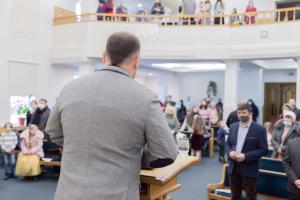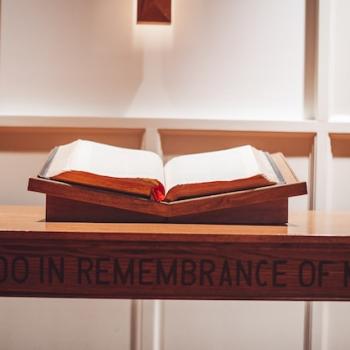Every now and then, I find myself in a one-sided “conversation.” Probably at least in part because I sometimes take a second to think before I speak.
I want to collect my thoughts, which can often be found skittering away rapidly in many directions. I tend to process internally and then say only what has been (at least a little bit) processed.
I’m totally comfortable with this. But sometimes others are not.
Sometimes—whether out of discomfort, or maybe an assumption that I don’t have anything to say just because I’m not spitting it out quickly, I’m not sure—I end up in conversations that feel a little uneven. Someone is less talking with me and more talking to me—or, to put it less politely, talking at me. It isn’t really a two-sided dialogue. It’s more like a monologue, or like a diatribe.
I’m there as a listener but not a full conversational participant. It’s uncomfortable. And it isn’t really a conversation.
We Learn Through Conversation

I reflect on this because I’ve been reflecting on sermons. What even are they? What are they meant to be? How do we hear them? Last week I shared that my experiences have led me to take sermons with a grain of salt, and that I’m okay with this.
I think of Jesus, talking with the unnamed Samaritan woman at the well (John 4), or with Nicodemus in the dead of night (John 3). Speaking in extended conversations. Especially with the Samaritan woman, complete with pushback, give and take. Marked by mutuality.
This is often how we learn most effectively. We don’t need to be told what to think, but to be invited into conversations that help us think differently.
What does this mean, then, for church? For preaching?
Preaching As Conversation
In If God Still Breathes, Why Can’t I? (Eerdmans 2021), biblical scholar Angela Parker reflects on preaching and biblical authority:
“I regard authority as a ‘living’ and ‘breathing’ conversation. However, what many of us fail to understand is that conversation is always mutual. Has the idea of the ‘preaching’ hour replaced the concept of conversation as we think about biblical authority? How is the idea of Bible study, where congregants come and reason together about biblical texts, related to preaching moments?” (p. 27)
These are pressing questions. They press us to consider how we might exercise our agency to engage with biblical texts ourselves, rather than waiting for a preacher to do it for us.
My current church has experimented a bit with some of the forms this might take. For example:
- Three different preachers each offer a brief reflection on the same scripture text, from different angles.
- Two or three preachers engage in a conversation about the text in a sort of panel discussion.
- Our pastor reads a section of the scripture passage and then asks for thoughts and questions from the congregation before sharing her own.
There are many ways to rethink sermons as conversations, to shift our relationship from passive receivers of a monologue to active co-creators of meaning.
Transforming How We Engage
Parker goes on to reflect:
“Conversations, like relationships, should be generative and transformative. They demand response and mutuality. Relationships shape who we are and form our identity…relationships change, ebb, and flow….Why do we want to fix in eternal space our relationship to the Bible and to God? Neither relationships nor conversations remain fixed!” (p. 28)
Our conversations, our relationships, our sense of identity, our understanding of scripture, our relationship with God—all these things are constantly evolving. They’re always changing. Which can be disorienting. But it is also good.
Whether or not our churches are experimenting with some of the different forms a sermon-like conversation—or a conversation-like sermon—could take, we all have agency in how we respond to what is spoken on Sunday mornings. Even if a sermon isn’t presented in a conversational form, perhaps we can receive it as such.
We can talk about it with others, soliciting their thoughts as we offer ours. We can seek more information on the things we have questions about. We can challenge the things we feel we need to challenge. We can engage in a two-sided way, even if the Sunday morning service part of it was one-sided.
One-sided diatribes are not how conversation was meant to be. And they are not how we learn and grow. We can choose to treat sermons as part of an ongoing conversation among a community of faith. And, in so doing, we might find ourselves being transformed together.












